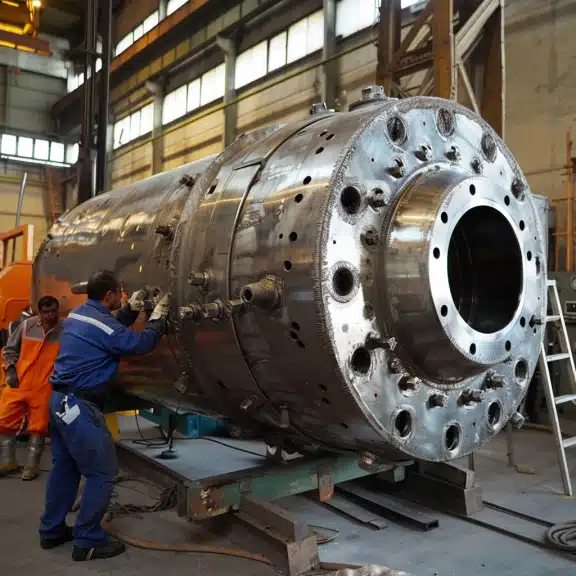
Pressure vessel inspections are critical to ensuring long-term safety, reliability, and performance. A proactive inspection program prevents failures, supports compliance, and extends equipment lifespan. This blog explains how inspections work, what standards apply, and how Red River supports safe operations through high-quality manufacturing and ongoing maintenance. With proper monitoring, testing, and documentation, pressure vessels remain secure, efficient, and aligned with regulatory expectations.
Understanding Pressure Vessel Inspections
At Red River, we apprehend that everyday pressure vessel inspections are essential for ensuring protection, compliance, and the best overall performance.
Meeting Legal and Regulatory Requirements
Our commitment to safety extends to compliance with legal and regulatory requirements, ensuring that your operations meet industry requirements.
Benefits of Entrusting Red River with Your Pressure Vessel Inspections
Prolonging Equipment Lifespan
Discover how our inspections contribute to the durability of your pressure vessels, saving you fees in the long run.
Mitigating Potential Hazards
Learn approximately the threat mitigation strategies we appoint to hold your place of business secure and stable.
Cost-Effective Maintenance Strategies
Explore how our value-powerful protection plans can fit seamlessly into your operational price range.
Methods and Techniques for Comprehensive Pressure Vessel Inspections
Overview of Inspection Procedures
Dive into the complete inspection methods implemented with the aid of our particularly professional personnel at Red River.
Visual Inspection Techniques
Understand the significance of visual inspections in identifying capacity issues and making sure the structural integrity of your vessels.
Non-Destructive Testing (NDT) Methods
Explore the superior NDT methods we employ for a radical exam of your pressure vessels without compromising their integrity.
Ultrasonic and Radiographic Testing
Learn approximately our use of cutting-edge technology, including ultrasonic and radiographic testing, to guarantee the reliability of your pressure vessels.
Incorporating Advanced Technologies for Precision
Robotics in Vessel Inspections
Discover how we leverage robotics for particular and green inspections, ensuring accuracy in our assessment.
IoT Applications for Real-time Monitoring
Explore the benefits of real-time tracking via IoT applications, providing you with instantaneous insights into the fitness of your pressure vessels.
Machine Learning for Predictive Maintenance
Learn how we employ gadgets gain knowledge of predictive protection, looking forward to issues earlier than they end up critical.
Upholding Compliance with Industry Standards
Meeting ASME Boiler and Pressure Vessel Code
Understand how Red River ensures compliance with ASME standards, ensuring the very best exceptional in our manufacturing and inspections.
API 510 Certification Requirements
Explore our adherence to API 510 certification requirements, showcasing our dedication to excellence.
Importance of Documentation for Compliance
Learn about our meticulous report-maintaining processes, crucial for audits and demonstrating adherence to industry requirements.
Pressure Vessel Inspections for Long-Term Reliability
Pressure Vessel Inspections remain one of the most effective ways to ensure safety, compliance, and operational efficiency. Incorporating preventive strategies, routine evaluations, and advanced monitoring technologies helps organizations protect valuable assets and avoid unnecessary risks. Red River continues to deliver high-quality manufacturing and inspection practices backed by strong safety values and long-term reliability.
Need a reliable partner?
Red River specializes in the design and manufacturing of pressure vessels. We also fabricate related items such as prefabricated spools and skid packages.
Reach Out to us today and experience the Red River difference. Where American Made and American Values come together, we care more.
Frequently Asked Questions
1. How often do pressure vessels need to be inspected?
Inspection frequency depends on vessel type, service conditions, and regulatory requirements. Many vessels require yearly inspections, while others may need more frequent evaluations. A detailed schedule ensures ongoing safety and compliance.
2. What to include in a pressure vessel inspection checklist?
A thorough checklist includes visual assessments, NDT evaluations, weld examinations, corrosion monitoring, and documentation review. These steps ensure complete insight into vessel condition.
3. How to inspect a pressure vessel effectively?
Inspections combine visual examinations, NDT techniques, operational monitoring, and documentation review. Using advanced tools like ultrasonic and radiographic testing enhances accuracy.
4. What are the safety standards for pressure vessels?
Safety standards include ASME requirements, API guidelines, and regulatory compliance obligations. These standards ensure that vessels are manufactured, operated, and maintained safely.
5. How do pressure vessels comply with safety regulations?
Compliance is achieved through proper design, documented inspections, consistent maintenance, and adherence to recognized standards. Red River supports these processes through expert evaluation and manufacturing practices.
Key Takeaways
- Pressure Vessel Inspections are essential for long-term safety and performance.
- Compliance with ASME and API standards ensures reliable operation.
- Preventive maintenance reduces downtime and improves equipment lifespan.
- Advanced tools like robotics and IoT enhance inspection accuracy.
- Red River provides trusted manufacturing and inspection expertise.
Related Blog Post

Pressure Vessel Design & Engineering: Concept to Launch

What is Pressure Vessel Design and Engineering: Code-Ready Guide

What are the Key Factors in Pressure Vessel Engineering

How Do You Design a Pressure Vessel: A Step-By-Step Guide

What is Pressure Vessel Fabrication and Manufacturing
No subpillar set for this blog post.
About Author

